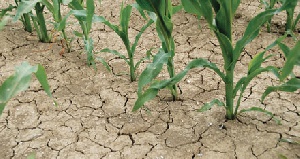The dry spell in the northern and other parts of the country, marked by two months of no rain, has led to stunted growth of food crops and significant financial losses for farmers.
The drought has raised concerns among Ghanaians about a potential food scarcity crisis.
In response to the dry spell, the government of Ghana, as a measure, has temporarily banned the export of grains, including rice, corn, and soy to prevent potential food shortages.
At a press briefing on August 29, 2024, the Minister of Finance, Dr. Mohammed Amin Adam, outlined additional emergency measures implemented by the government to mitigate the effects of the dry spell and to prevent a potential food shortage.
The following are the measures:
1. A temporary ban on the export of selected grains, including maize, rice, and soybeans.
2. Mopping up stock from local farmers to ensure they do not suffer adversely from the export ban.
3. Importation of grains (including maize and rice) and poultry feed to build reserves.
4. Drought relief support, including cash transfers to vulnerable farmers affected by the dry spell to partially compensate for their losses.
5. Input support, providing affected farmers in the Northern and Southern regions with inputs such as fertilizer, urea, maize seeds, and rice seeds to enable replanting when the rains return and to boost production during the minor season.
Worth noting is that significant losses have been recorded with crops such as rice, millet, maize and others withering due to lack of rainfall.
MAG/AE
General News of Friday, 30 August 2024
Source: www.ghanaweb.com

















